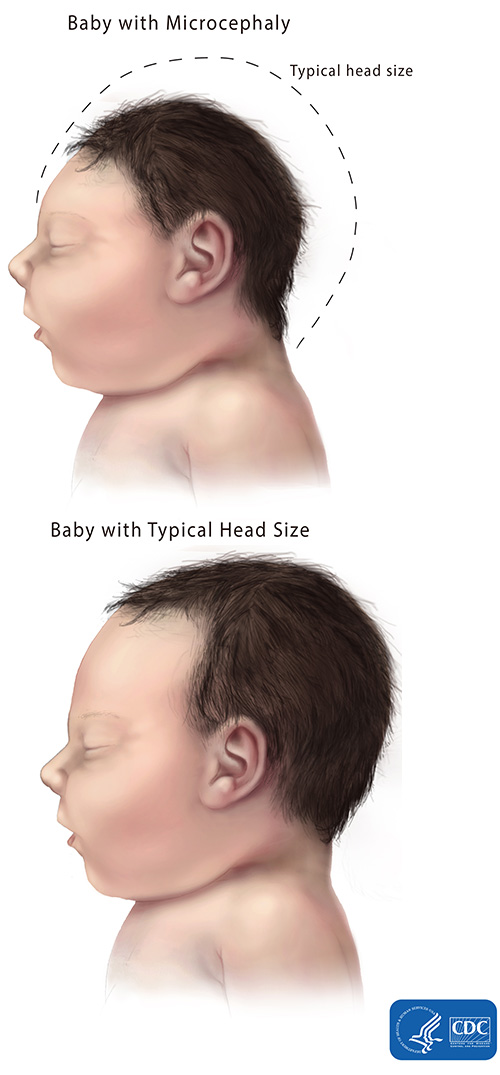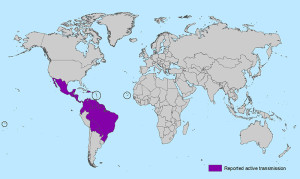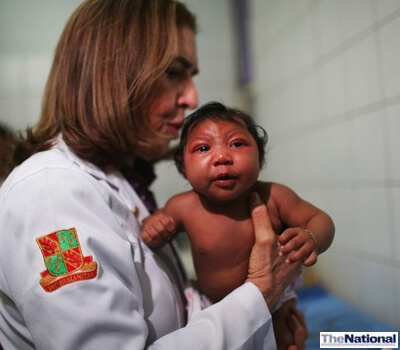Just like the Ebola disease, the new Zika fever virus is declared a global emergency. The outbreak started in Brazil when pregnant women gave birth to babies with birth defects and poor pregnancy outcomes. Zika is primarily transmitted through the bite of infected Aedes mosquitoes, the same mosquitoes that spread Chikungunya and dengue. These mosquitoes are aggressive daytime biters and they can also bite at night. Mosquitoes become infected when they bite a person already infected with the virus. Infected mosquitoes can then spread the virus to other people through bites. It can also be transmitted to a new born baby during time of birth.
Are pregnant women affected by the virus ?
If a pregnant women is affected with the Zika virus, the baby could be born with a serious birth defect of the brain called “microcephaly” and have other poor pregnancy outcomes. Microcephaly is a condition in which a baby’s head is smaller than expected when compared to babies of the same sex and age. Depending on how severe the microcephaly is, problems can range from:
- Seizures
- Developmental delay, such as problems with speech and also sitting, standing, and walking.
- Intellectual disability (decreased ability to learn and function in daily life)
- Problems with movement and balance
- Feeding problems, such as difficulty swallowing
- Hearing loss
- Vision problems
Women who are pregnant:
- Consider postponing travel to any area where Zika virus transmission is ongoing.
- If you must travel to one of these infected places, go see your doctor and successfully follow how to prevent mosquito bites during the trip.
Symptoms & Diagnoses:
- Most common symptoms of Zika are fever, rash, joint pain, or red eyes. It could also include symptoms of muscle pain and headache.
- Severe disease requiring hospitalization is uncommon and deaths are rare.
- The symptoms of Zika are similar to those of dengue and chikungunya.
- No vaccine or medications are available to treat or prevent the Zika virus.
How to Prevent the symptoms:
- Get plenty of rest.
- Drink fluids daily to prevent dehydration.
- Take medicine such as acetaminophen to relieve fever and pain.
- Do not take aspirin and other non-steroidal anti-inflammatory drugs (NSAIDs), like ibuprofen. Aspirin and NSAIDs should be avoided to reduce the risk of hemorrhage (bleeding).
Areas that are currently transmitted with Zika:

AMERICAS
- Barbados
- Bolivia
- Brazil
- Colombia
- Commonwealth of Puerto Rico, US territory
- Costa Rica
- Curacao
- Dominican Republic
- Ecuador
- El Salvador
- French Guiana
- Guadeloupe
- Guatemala
- Guyana
- Haiti
- Honduras
- Martinique
- Mexico
- Nicaragua
- Panama
- Paraguay
- Saint Martin
- Suriname
- U.S. Virgin Islands
- Venezuela
OCEANIA/PACIFIC ISLANDS
- American Samoa
- Samoa
AFRICA
- Cape Verde


Itwasntme • Mar 7, 2016 at 1:03 pm
It is essential for scientist to develop a cure for zika, quickly. For this disease is detrimental to the future generation of south America, mainly, statistically speaking. Also I feel as if the Government should be involved if not already because the government is needed to help keep the disease from further spreading.
ivan • Mar 4, 2016 at 2:22 pm
this story really got my attention, I think we all should be aware of this dangerous disease. checking out with doctors can save you from this dangerous disease.
Jchavez92 • Feb 11, 2016 at 2:14 pm
I find this pretty extreme and should concern the government, even though it has not yet reached the united states the government should at least invest something into it its only a matter of time before it does reach the united states. Considering the fact it is on its reserved territories, most of they should do it for the kids that could be born ill everyone deserves a good shot at life.
http://www.cdc.gov/zika/geo/
Enocks97 • Feb 4, 2016 at 12:13 pm
I think it is important that the entire nation is on alert and cautious of this disease. It is important that we are cooperative so that babies may be danger and saved.